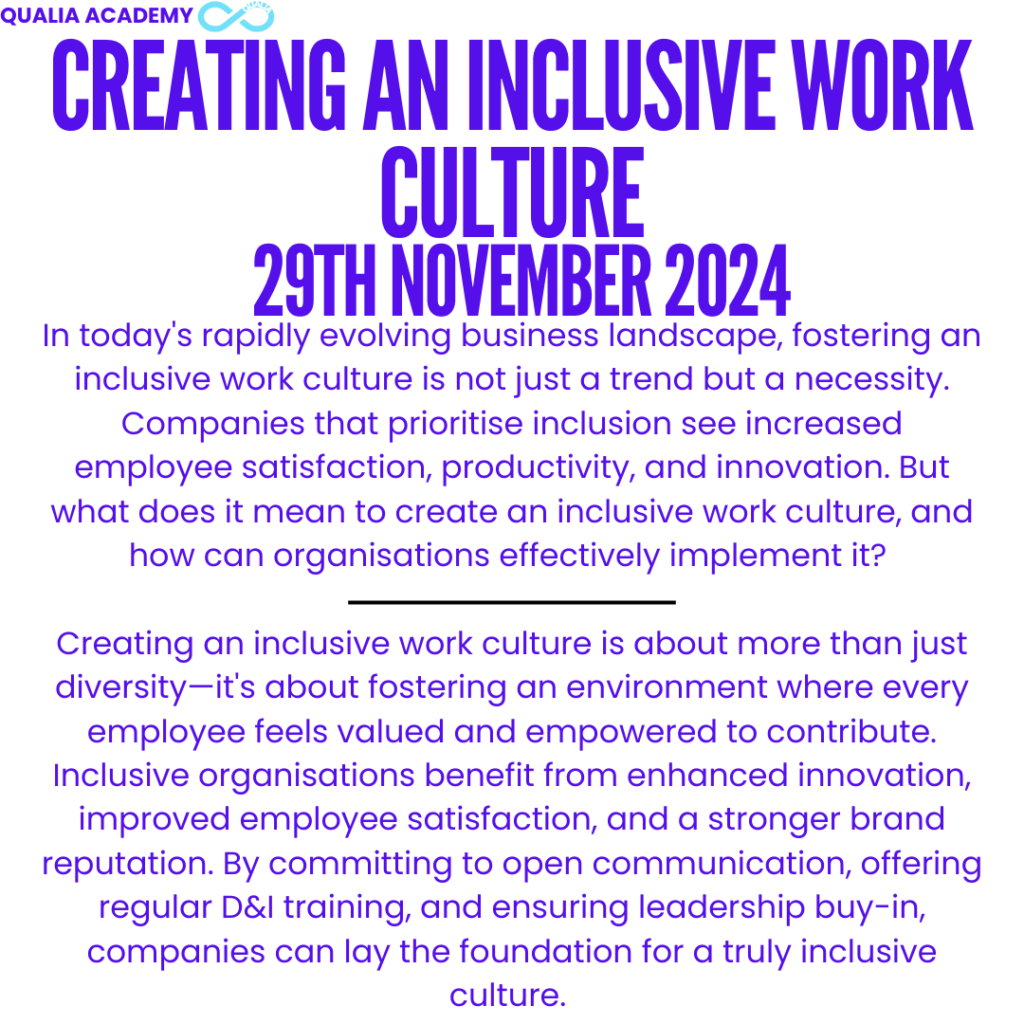Inclusive work place culture, is not just a trend but a necessity, In today’s rapidly evolving business landscape. Companies that prioritise inclusion see increased employee satisfaction, productivity, and innovation. But what does it mean to create an inclusive work culture, and how can organisations effectively implement it?

This blog will explore the importance of an inclusive work culture, its benefits, and practical steps to build an environment where diversity is celebrated, and everyone feels they belong.
What is an Inclusive Work Culture?
An inclusive work culture refers to an environment where employees of all backgrounds, identities, and experiences feel valued, respected, and able to contribute fully. It goes beyond simply hiring a diverse workforce. Inclusion ensures that people from various gender, racial, cultural, and socio-economic backgrounds, as well as those with different physical abilities or neurodiversities, are provided with equal opportunities to thrive.
Inclusion creates a workplace where diversity is not just accepted but embraced. It is about fostering a sense of belonging and ensuring that each person’s unique qualities are seen as assets to the organisation. This environment helps reduce unconscious bias, enhances collaboration, and ensures that all voices are heard.
Why is an Inclusive Work Culture Important?
Creating an inclusive workplace culture benefits everyone—employees, leadership, and the business itself. Here are some reasons why it’s crucial for organisations today:
Improved Employee Retention and Satisfaction
Employees are more likely to stay with companies that value their individuality and make them feel like they belong. When people feel included, they are more engaged, satisfied with their roles, and motivated to contribute to the company’s success.
Increased Innovation and Creativity Diverse teams are more innovative. When individuals from different backgrounds
collaborate, they bring diverse perspectives, leading to fresh ideas and solutions. By encouraging employees to share their unique viewpoints, companies can drive creativity and innovation.
Broader Talent Pool
Companies that cultivate inclusive work environments are more attractive to top talent. Talented professionals are more likely to gravitate towards workplaces where they feel their identities will be respected and where their personal values align with the organisation’s ethos.
Better Problem Solving
Diverse teams perform better when solving problems. Having multiple perspectives allows teams to view challenges from various angles, leading to more comprehensive solutions.
Enhanced Brand Reputation
Customers and clients increasingly prefer to do business with companies that are committed to inclusivity. A positive and inclusive company culture can enhance a brand’s reputation, attracting both clients and high-calibre employees.
Key Elements of an Inclusive Work Culture
Creating an inclusive work culture is not a one-size-fits-all approach. However, certain key elements contribute to fostering inclusivity in any organisation:
Leadership Commitment
For inclusion to be ingrained in the company culture, leadership must be fully committed. Leaders set the tone for the organisation, so it’s essential for them to model inclusive behaviour and actively advocate for diversity and inclusion initiatives. This commitment should be visible through actions, not just words.
Open Communication
Encouraging open communication is critical to inclusion. Employees should feel comfortable sharing their thoughts and experiences without fear of reprisal. Providing multiple platforms, such as town hall meetings, anonymous surveys, or suggestion boxes, can give employees the confidence to speak up.
Ongoing Diversity and Inclusivity
Training One-off training sessions are not enough to create a lasting change. Companies should implement regular diversity and inclusion (D&I) training that helps employees recognise
unconscious biases, address microaggressions, and understand the importance of allyship. These sessions should be mandatory for all staff, regardless of seniority.
Mentorship and Sponsorship Programmes
Offering mentorship and sponsorship opportunities can help employees from underrepresented groups to advance in their careers. Mentorship fosters personal development, while sponsorship ensures that high-potential employees have advocates within the company to help them progress in their roles.
Flexible Inclusive Work Arrangements
Inclusivity goes beyond cultural or gender representation—it also includes supporting various work styles and life commitments. Providing flexible work arrangements, such as remote working options, flexible hours, or job sharing, ensures that employees with different needs can thrive in the workplace.
Celebrating Cultural Differences
Celebrating the diverse cultures and backgrounds of employees can foster a sense of belonging. Companies can hold cultural events, recognise international holidays, and encourage the sharing of personal stories. This helps create a more connected workforce that understands and appreciates different cultural perspectives.
Employee Resource Groups (ERGs)
ERGs, also known as affinity groups, are employee-led groups that foster a sense of community within the organisation. These groups bring together employees who share common backgrounds or interests, such as women in leadership, LGBTQ+ employees, or employees with disabilities. ERGs can be instrumental in supporting underrepresented employees and creating a more inclusive workplace.
Practical Steps to Create an Inclusive Work Culture
Now that we’ve outlined the key elements of an inclusive work place, let’s explore practical steps that organisations can take to build one.
Assess Your Current Culture and Create an Inclusive Work Place
Begin by assessing the current state of your organisation’s culture. This can be done through anonymous employee surveys, focus groups, or external D&I consultants. Understanding where your company currently stands will help you identify areas that need improvement. This could be by way of abilities, ethnicities, age, gender or neurodivergence.
Develop an Inclusive Strategy
Once you’ve assessed the current culture, create a strategy that addresses the gaps. Set clear goals and objectives for improving inclusivity. This strategy should be tailored to your organisation’s specific needs and include actionable steps, timelines, and accountability measures.
Incorporate Diversity into Recruitment and Hiring
To foster an inclusive culture, it’s essential to start at the recruitment stage. Ensure that job postings are free of biased language, and consider implementing blind recruitment processes to remove unconscious bias in hiring decisions. Additionally, strive to build diverse interview panels to provide a broader perspective on candidates.
Create Inclusive Policies
Review your organisation’s policies to ensure they promote inclusivity. This might involve revising parental leave policies to be more gender-inclusive, offering accommodations for employees with disabilities, or implementing gender-neutral bathroom facilities.Monitor
Progress and Make Adjustments
Building a bias free culture is an ongoing process. Regularly monitor the effectiveness of your diversity and inclusion initiatives by collecting employee feedback and analysing diversity metrics. Be open to adjusting your approach based on the data and feedback you receive.
Moving Forwards
Creating an inclusive work culture is about more than just diversity—it’s about fostering an environment where every employee feels valued and empowered to contribute. Inclusive organisations benefit from enhanced innovation, improved employee satisfaction, and a stronger brand reputation. By committing to open communication, offering regular D&I training, and ensuring leadership buy-in, companies can lay the foundation for a truly inclusive culture.
In a world where equity is increasingly becoming a priority, organisations that take proactive steps to embrace diversity and foster a sense of belonging will thrive in the future of work.









